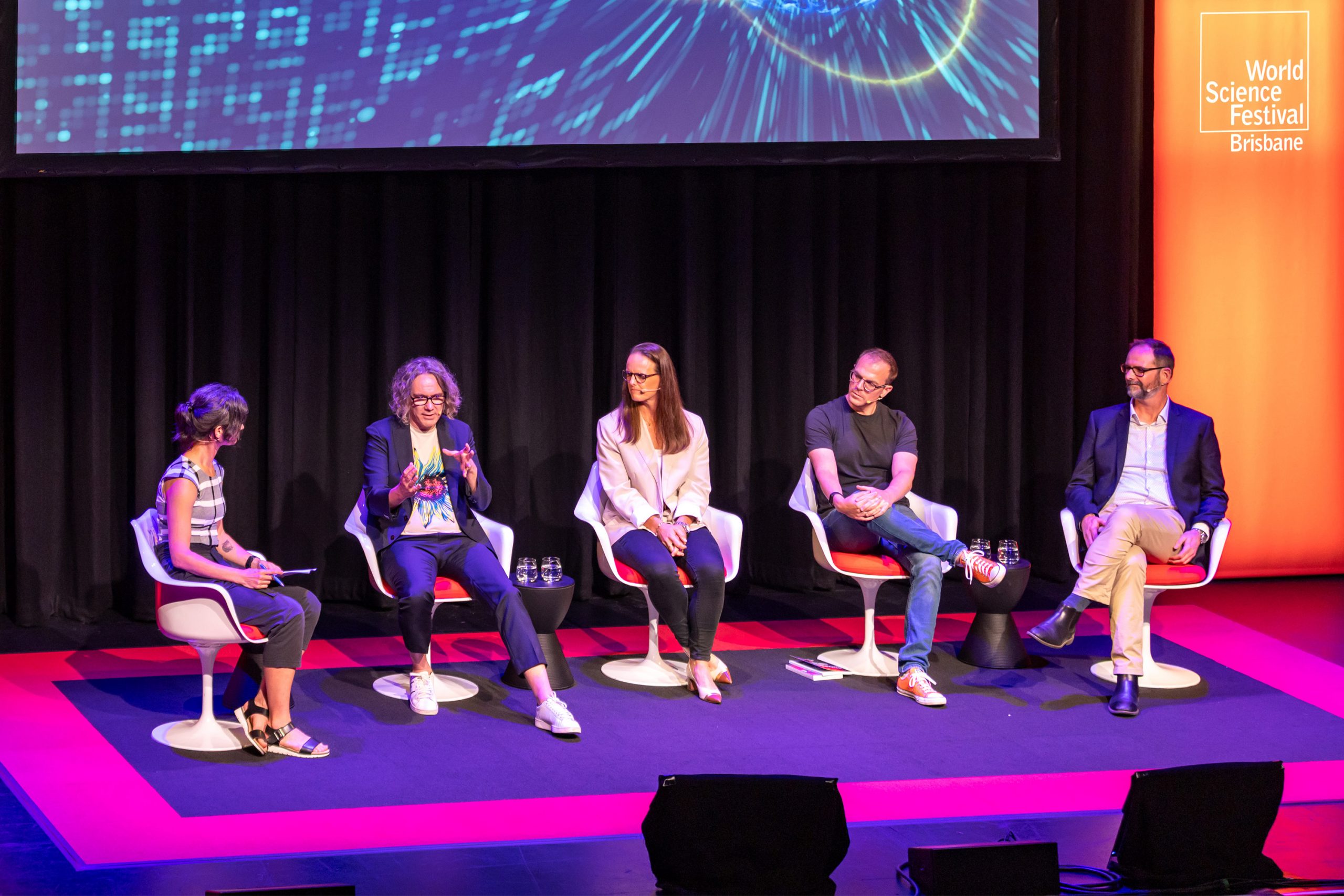The Second Quantum Revolution: How Australian Science Is Leading a Quantum Leap

The Second Quantum Revolution: How Australian Science Is Leading a Quantum Leap
Welcome to the Second Quantum Revolution: Unlocking the potential of quantum science
From cracking the mysteries of the universe to fine-tuning human performance, quantum science is a rapidly evolving frontier with the potential to advance the technological world around us.
Recorded live by ABC Radio National’s Big Ideas program, as part of this year’s World Science Festival Brisbane, audiences went on a deep dive into the world of quantum science with some of Australia’s brightest minds, sharing their work that is feeding the Second Quantum Revolution – the next significant leap in quantum science.
Join ABC presenter Belinda Smith, with Australian leaders, Geoff Pryde, Chief Technical Director of PsiQuantum, Dr Clare Minahan Sports Science Professor at Griffith University, Dr Chris Ferrie, Associate Professor in Quantum Sciences at the University of Technology Sydney, and Tim Gould, Associate Professor at Griffith University.
The possibilities of quantum’s second wave
From quantum computers that will solve highly complex problems to ultra-sensitive sensors that will monitor human biology, we are living through the next wave of quantum science discovery.
The first wave gave us lasers, semiconductors, and GPS. The second leverages phenomena like superposition and entanglement, unlocking new ways to store, process and transmit information.
As Associate Professor Tim Gould explains, “There’s very few aspects of our lives that aren’t influenced in some way by quantum mechanics – my favourite use is the GPS, which was a specialised device, and now everyone has one in their phone.”
Australia, and Queensland in particular, is poised to play a pivotal role in the next wave of quantum science breakthroughs, as explored through World Science Festival Brisbane’s showcase of quantum experts.
Building the world’s first useful quantum computer – in Brisbane
At the cutting edge of this global quantum race is Brisbane-based company PsiQuantum, led by Chief Technical Officer Geoff Pryde. With roots tracing back to research at the University of Queensland, PsiQuantum is aiming to build the world’s first commercially useful quantum computer — a machine capable of running millions of ‘qubits’ (the basic unit of information in a quantum computer) to solve previously unsolvable problems.
Rather than reinvent the wheel, PsiQuantum’s approach is pragmatic: leveraging existing semiconductor manufacturing techniques and using photons (light particles) as the basis for quantum computing.
“Quantum computers tend to work well when you have a very complicated problem with a relatively simple solution,” Pryde says.
An example he gives is organising a delivery route for a large amount of Amazon deliveries – a problem that can become complicated very quickly.
“A quantum computer can actually sort and explore every one of these possibilities at once, and our goal here is to find the best one.”
PsiQuantum’s quantum system won’t just sit on a benchtop — think warehouse-scale racks connected to helium-cooled cryo plants, Pryde said the detectors themselves will be the temperature of deep space, -270 degrees Celsius.
This ambitious architecture is what’s needed to scale up to the millions of qubits required for real-world impact: from new pharmaceuticals, to materials that could revolutionise green energy, and complex problems that commercial companies will invest in quantum solutions for.
Quantum science meets sports science on the road to Brisbane 2032
Dr Clare Minahan, Associate Professor of Exercise and Sport at Griffith University, has entered the realm of quantum science in her work to support the optimisation of female athlete performance.
Minahan is leading research to address iron deficiency in elite female athletes, a condition that affects up to 30% of this group and significantly hinders endurance, recovery, and cognitive function. Current diagnostics rely on indirect markers like ferritin, which can be imprecise.
Enter quantum sensing.
Minahan is partnering with researchers at the University of Melbourne and the Florey Institute to pilot quantum sensors using nanodiamonds — capable of detecting minute magnetic fields produced by iron molecules. These sensors would use principles like quantum entanglement to vastly improve precision.
“It’s a real problem, particularly thinking about the Brisbane 2032 Olympics coming along,” Dr Minahan says.
“We want our athletes to be absolutely in their prime and optimised, having low iron means that you’re putting in jeopardy your endurance, (and) your mental sharpness.”
Beyond the hopes of supporting Olympic glory, future applications of the quantum iron sensors could extend to GP clinics, schools, and pharmacies.
For the full conversation on the Second Quantum Revolution, click here to listen to ABC Radio National’s Big Ideas program hosted by Natasha Mitchell.